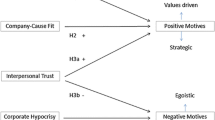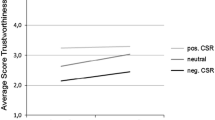Abstract
This study investigates whether consumers’ perceptions of motives influence their evaluation of corporate social responsibility (CSR) efforts. The study reveals the mediating role of consumer trust in CSR evaluation frameworks; managers should monitor consumer trust, which seems to be an important subprocess regulating the effect of consumer attributions on patronage and recommendation intentions. Further, managers may allay the negative effects of profit-motivated giving by doing well on service quality perceptions. On the other hand, appropriately motivated giving continues to positively affect trust regardless of the performance of the firm on service quality provision.



Similar content being viewed by others
References
Aiken, L. S., & West, S. G. (1991). Multiple regression: Testing and interpreting interactions. Newbury Park: Sage.
Arumi, A. M., Wooden, R., Johnson, J., Farkas, S., Duffet, A., & Amber, O. (2005). The charitable impulse: A public agenda report. http://www.publicagenda.org.
Bagozzi, R. P. (1992). The self-regulation of attitudes, intentions, and behavior. Social Psychology Quarterly, 55(2), 178–204. doi:10.2307/2786945.
Barone, M. J., Miyazaki, A. D., & Taylor, K. A. (2000). The influence of cause-related marketing on consumer choice: Does one good turn deserve another? Journal of the Academy of Marketing Science, 28(2), 248–263. doi:10.1177/0092070300282006.
Barone, M. J., Norman, A. T., & Miyazaki, A. D. (2007). Consumer response to retailer use of cause-related marketing: Is more fit better? Journal of Retailing, 83(4), 437–445. doi:10.1016/j.jretai.2007.03.006.
Baumeister, R. F., Bratislavsky, E., Finkenauer, C., & Vohs, K. D. (2001). Bad is stronger than good. Review of General Psychology, 5(4), 323–370. doi:10.1037/1089-2680.5.4.323.
Berens, G., van Riel, C. B. M., & van Rekom, J. (2007). The CSR-quality trade-off: When can corporate social responsibility and corporate ability compensate each other? Journal of Business Ethics, 74(3), 233–252. doi:10.1007/s10551-006-9232-0.
Bhattacharya, R., Devinney, T. M., & Pillutla, M. M. (1998). A formal model of trust based on outcomes. Academy of Management Review, 23(3), 459–472. doi:10.2307/259289.
Blau, P. M. (1964). Exchange and power in social life. New York: Wiley.
Bolton, R. N., Lemon, K. N., & Verhoef, P. C. (2004). The theoretical underpinnings of customer asset management: A framework and propositions for future research. Journal of the Academy of Marketing Science, 32(3), 271–292. doi:10.1177/0092070304263341.
Bowen, J. (1990). Development of a taxonomy of services to gain strategic marketing insights. Journal of the Academy of Marketing Science, 18, 43–49 (Winter) doi:10.1007/BF02729761.
Brady, M., & Cronin, J. (2001). Some new thoughts on conceptualizing perceived service quality: A hierarchical approach. Journal of Marketing, 65, 34–49 (July) doi:10.1509/jmkg.65.3.34.18334.
Brady, M. K., Knight, G. A., Cronin, J., Tomas, G., Hult, M., & Keillor, B. D. (2005). Removing the contextual lens: A multinational, multi-setting comparison of service evaluation models. Journal of Retailing, 81(3), 215–230. doi:10.1016/j.jretai.2005.07.005.
Carrigan, M., & Attalla, A. (2001). The myth of the ethical consumer—do ethics matter in purchase behaviour? Journal of Consumer Marketing, 18(7), 560–577. doi:10.1108/07363760110410263.
Cropanzano, R., & Mitchell, M. S. (2005). Social exchange theory: An interdisciplinary review. Journal of Management, 31, 1–27. doi:10.1177/0149206305279602.
Dabholkar, P. A., & Bagozzi, R. P. (2002). An attitudinal model of technology-based self-service: Moderating effects of consumer traits and situational factors. Journal of the Academy of Marketing Science, 30(3), 184–201.
Ellen, P. S., Web, D. J., & Mohr, L. A. (2006). Building corporate associations: Consumer attributions for corporate social responsibility programs. Journal of the Academy of Marketing Science, 34(2), 147–157. doi:10.1177/0092070305284976.
Fein, S. (1996). Effects of suspicion on attributional thinking and the correspondence bias. Journal of Personality and Social Psychology, 70(6), 1164–1184. doi:10.1037/0022-3514.70.6.1164.
Franklin, D. (2008). Just good business: A special report on corporate social responsibility. The Economist, (January), 19.
Geyskens, I., Steenkamp, J., & Kumar, N. (1998). Generalizations about trust in marketing channel relationships using meta-analysis. International Journal of Research in Marketing, 15(3), 223–248. doi:10.1016/S0167-8116(98)00002-0.
Gilbert, D. T., & Malone, P. S. (1995). The correspondence bias. Psychological Bulletin, 117(1), 21–38. doi:10.1037/0033-2909.117.1.21.
Giving USA Foundation (2007). Annual Report on Philanthropy 2006. http://www.aafrc.org/press_releases/gusa.cfm.
Globe Scan-MRB (2006). Corporate social responsibility in Greece (in Greek). http://www.instofcom.gr/03CSR%202007.pdf.
Godfrey, P. C. (2005). The relationship between corporate philanthropy and shareholder wealth: A risk management perspective. Academy of Management Review, 30(4), 777–798.
Handelman, J. M., & Arnold, J. A. (1999). The role of marketing actions with a social dimension: Appeals to the institutional environment. Journal of Marketing, 63, 33–48. doi:10.2307/1251774.
Helm, A. (2004). Cynics and skeptics: Consumer dispositional trust. Advances in Consumer Research. Association for Consumer Research (U. S.), 31, 345–351.
Herzberg, F. (1966). Work and the nature of man. Cleveland: World Publishing Company.
Hosmer, L. T. (1995). Trust: The connecting link between organizational theory and philosophic ethics. Academy of Management Review, 20(2), 379–403. doi:10.2307/258851.
Jones, E. E., & Davis, K. (1965). From acts to dispositions. In Berkowitz, L. (Eds.), Advances in experimental psychology (pp. 219–266). New York: Academic.
Keaveney, S. M. (1995). Customer switching behavior in service industries: An exploratory study. Journal of Marketing, 59, 71–82 (April) doi:10.2307/1252074.
Lam, S. Y., Venkatesh, S., Erramilli, M. K., & Murthy, B. (2004). Customer value, satisfaction, loyalty, and switching costs: An illustration from a business-to-business service context. Journal of the Academy of Marketing Science, 32(3), 293–311. doi:10.1177/0092070304263330.
Luo, X., & Bhattacharya, C. B. (2006). Corporate social responsibility, customer satisfaction, and market value. Journal of Marketing, 70(4), 1–18. doi:10.1509/jmkg.70.4.1.
MacKenzie, S. B., & Lutz, R. J. (1989). An empirical examination of the structural antecedents of attitude toward the ad in an advertising pretesting context. Journal of Marketing, 53(2), 48–65.
Mohr, L., Eroglu, D., & Ellen, P. (1998). The development and testing of a measure of skepticism toward environmental claims in marketers’ communications. The Journal of Consumer Affairs, 32(1), 30–55.
Morgan, R. M., & Hunt, S. D. (1994). The commitment-trust theory of relationship marketing. Journal of Marketing, 58(3), 20–38. doi:10.2307/1252308.
Nysveen, H., Pedersen, P. E., & Thorbjørnsen, H. (2005). Intentions to use mobile services: Antecedents and cross-service comparisons. Journal of the Academy of Marketing Science, 33(3), 1–17. doi:10.1177/0092070305276149.
Ping, R. A. (1996). Latent variable interaction and quadratic effect estimation: A two-step technique using structural equation analysis. Psychological Bulletin, 119(1), 166–175. doi:10.1037/0033-2909.119.1.166.
Ping, R. A. (2003). Latent variable interactions and quadratics in survey data: A source book for theoretical model testing, 2nd ed. [on-line monograph].
Porter, M. E., & Kramer, M. R. (2004). Strategy and society: The link between competitive advantage and corporate social responsibility. Harvard Business Review, 84(12), 5–12.
Progressive Grocer (2008). Special report: Environmental sustainability: Seeing green. http://www.progressivegrocer.com/progressivegrocer/research-analysis/index.jsp.
Reuters (2008). Consumers puts ads to greenwashing test. http://www.reuters.com/.
Sen, S., Bhattacharya, C. B., & Korschun, D. (2006). The role of corporate social responsibility in strengthening multiple stakeholder relationships: A field experiment. Journal of the Academy of Marketing Science, 34(2), 158–166. doi:10.1177/0092070305284978.
Shrout, P. E., & Bolger, N. (2002). Mediation in experimental and nonexperimental studies: New procedures and recommendations. Psychological Methods, 7, 422–445. doi:10.1037/1082-989X.7.4.422.
Sirdeshmukh, D., Singh, J., & Sabol, B. (2002). Consumer trust, value, and loyalty in relational exchanges. Journal of Marketing, 66(1), 5–37. doi:10.1509/jmkg.66.1.15.18449.
Smith, R. E., & Hunt, S. D. (1978). Attributional processes and effects in promotional situations. The Journal of Consumer Research, 5(3), 149–158. doi:10.1086/208725.
Varadarajan, P. R., & Menon, A. (1988). Cause-related marketing: A coalignment of marketing strategy and corporate philanthropy. Journal of Marketing, 52, 58–74 (July) doi:10.2307/1251450.
Zafirovski, M. (2003). Some amendments to social exchange theory: A sociological perspective. Theory & Science, 4(2) Online paper. http://theoryandscience.icaap.org/content/vol004.002/01_zafirovski.html.
Zeithaml, V. A., Berry, L. L., & Parasuraman, A. (1996). The behavioral consequences of service quality. Journal of Marketing, 60(2), 31–36. doi:10.2307/1251929.
Acknowledgment
The authors are grateful to Editor David W. Stewart and four anonymous JAMS reviewers for comments on earlier versions of the article. This research is supported by the European Social Fund (ESF), Operational Program for Educational and Vocational Training II: Program PYTHAGORAS II.
Author information
Authors and Affiliations
Corresponding author
Appendix
Appendix
Rights and permissions
About this article
Cite this article
Vlachos, P.A., Tsamakos, A., Vrechopoulos, A.P. et al. Corporate social responsibility: attributions, loyalty, and the mediating role of trust. J. of the Acad. Mark. Sci. 37, 170–180 (2009). https://doi.org/10.1007/s11747-008-0117-x
Received:
Accepted:
Published:
Issue Date:
DOI: https://doi.org/10.1007/s11747-008-0117-x




